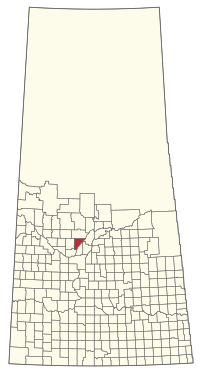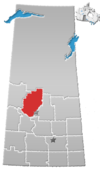Rural Municipality of Blaine Lake No. 434
Blaine Lake No. 434 | |
|---|---|
| Rural Municipality of Blaine Lake No. 434 | |
 Location of the RM of Blaine Lake No. 434 in Saskatchewan | |
| Coordinates: 52°49′37″N 106°46′48″W / 52.827°N 106.780°WCoordinates: 52°49′37″N 106°46′48″W / 52.827°N 106.780°W[1] | |
| Country | Canada |
| Province | Saskatchewan |
| Census division | 16 |
| SARM division | 5 |
| Formed[2] | December 9, 1912 |
| Government | |
| • Reeve | William Chalmers |
| • Governing body | RM of Blaine Lake No. 434 Council |
| • Administrator | Jennifer Gutknecht |
| • Office location | Blaine Lake |
| Area (2016)[4] | |
| • Land | 799.69 km2 (308.76 sq mi) |
| Population (2016)[4] | |
| • Total | 291 |
| • Density | 0.4/km2 (1/sq mi) |
| Time zone | CST |
| • Summer (DST) | CST |
| Area code(s) | 306 and 639 |
The Rural Municipality of Blaine Lake No. 434 (2016 population: 291) is a rural municipality (RM) in the Canadian province of Saskatchewan within Census Division No. 16 and SARM Division No. 5. The RM extends east to the North Saskatchewan River and north to the Village of Marcelin.
History[]
This section needs additional citations for verification. (April 2020) |
The RM of Blaine Lake No. 434 incorporated as a rural municipality on December 9, 1912.[2]
The story of Sgt John Wilson: One of Canada's most sensational murders took place close to Blaine Lake in 1917.[citation needed] The only Royal Canadian Mounted Police officer ever to be hanged for murder, Sgt John Wilson killed his wife, Polly Wilson, and his unborn child, to marry Jessie Patterson of Blaine Lake.[citation needed] They wed two days after his wife's murder.[citation needed] Polly Wilson had traveled to Canada from Scotland, leaving behind two children, and was pregnant with a third when she was killed. Her body was discovered in a culvert near Waldheim.[citation needed]
Geography[]
Communities and localities[]
The following urban municipalities are surrounded by the RM.
- Towns
- Blaine Lake
- Villages
- Marcelin
Demographics[]
In the 2016 Census of Population conducted by Statistics Canada, the RM of Blaine Lake No. 434 recorded a population of 291 living in 114 of its 128 total private dwellings, a 1% change from its 2011 population of 288. With a land area of 799.69 km2 (308.76 sq mi), it had a population density of 0.4/km2 (0.9/sq mi) in 2016.[4]
In the 2011 Census of Population, the RM of Blaine Lake No. 434 recorded a population of 288, a -4.6% change from its 2006 population of 302. With a land area of 799.69 km2 (308.76 sq mi), it had a population density of 0.4/km2 (0.9/sq mi) in 2011.[7]
Government[]
The RM of Blaine Lake No. 434 is governed by an elected municipal council and an appointed administrator that meets on the second Tuesday of every month.[3] The reeve of the RM is William Chalmers while its administrator is Jennifer Gutknecht.[3] The RM's office is located in Blaine Lake.[3]
References[]
- ^ "Pre-packaged CSV files - CGN, Canada/Province/Territory (cgn_sk_csv_eng.zip)". Government of Canada. July 24, 2019. Retrieved May 23, 2020.
- ^ Jump up to: a b "Rural Municipality Incorporations (Alphabetical)". Saskatchewan Ministry of Municipal Affairs. Archived from the original on April 21, 2011. Retrieved May 9, 2020.
- ^ Jump up to: a b c d "Municipality Details: RM of Blaine Lake No. 434". Government of Saskatchewan. Retrieved May 21, 2020.
- ^ Jump up to: a b c "Population and dwelling counts, for Canada, provinces and territories, and census subdivisions (municipalities), 2016 and 2011 censuses – 100% data (Saskatchewan)". Statistics Canada. February 8, 2017. Retrieved May 1, 2020.
- ^ "Saskatchewan Census Population" (PDF). Saskatchewan Bureau of Statistics. Archived from the original (PDF) on September 24, 2015. Retrieved May 9, 2020.
- ^ "Saskatchewan Census Population". Saskatchewan Bureau of Statistics. Retrieved May 9, 2020.
- ^ "Population and dwelling counts, for Canada, provinces and territories, and census subdivisions (municipalities), 2011 and 2006 censuses (Saskatchewan)". Statistics Canada. June 3, 2019. Retrieved May 1, 2020.
- Rural municipalities in Saskatchewan
- Blaine Lake No. 434, Saskatchewan
- Division No. 16, Saskatchewan


